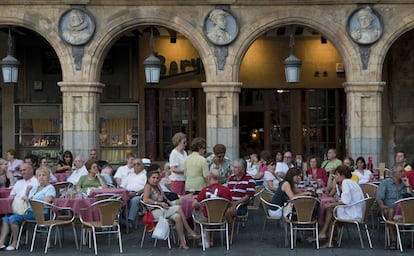For safety, Spanish city warns bars to keep sharp knives off terrace tabletops
The precautionary measure, first suggested by the local police at Easter, seeks to avoid making potential “weapons” available to passersby
Although no one is saying as much, efforts are underway to keep potential “weapons” off the streets of Spain. First Madrid banned vehicles weighing more than 3.5 tons in the center during its Easter processions, and now Salamanca’s local police force is advising its bars and restaurants to keep knives and forks off the tables on their terraces until customers are seated.

“Of course, a table that is set is more attractive,” says Miguel Ángel Madruga, manager of Don Mauro, a traditional restaurant in Salamanca’s main square. “But safety comes first. The customers don’t usually mind and it’s been easy to adapt to.”
The knife blades on the tables aren’t usually small, so we are taking preventative measures
Local police spokesman
Both the local Association of Catering Firms and the City Council stress that the measure, which has been well received, is not obligatory. “Bars and restaurants have gradually taken it on board and we believe it is a sensible precaution,” says a spokesman for the association.
When pressed to explain the reasons behind the initiative, a local police source said that, far from having to do with recent terrorist attacks in London and Manchester, the measure is merely a response to the growth of al fresco establishments in the city. “It is a historical city with a great many tourists and the measure is more to do with common sense,” said a spokesman, adding that a steak knife in the hands of any delinquent could be a dangerous weapon. “The knife blades on the tables aren’t usually small, so we are taking preventative measures.”
A similar explanation was given after the vehicle ban in Madrid, with the authorities justifying it as nothing more than a measure to increase security during crowded events.
Police are keen to scotch rumors that establishments failing to act on the advice will face fines of up to €3,000
This, despite the fact that 2016 figures from the central government indicate that crime has been falling in Spain in general and the perception of public insecurity dropped by six points to 3.2% between May 2010 and December last year, according to surveys carried out by the Center of Sociological Research.
Meanwhile, local police in Salamanca are keen to scotch the rumors that establishments failing to act on the advice will face fines of up to €3,000. “There has been no suggestion that this could happen,” says a police spokesman. “Another thing entirely is if they incur a penalty for a breach of the Public Safety Law.”
More commonly known as the “gag law,” the legislation, which came into effect in March 2015, considers the exhibition of dangerous objects that could endanger lives or physically harm people to be a minor offense, as long as a serious offense is not then committed.
The Spanish Catering Federation believes that the Salamanca initiative could go on to be adopted by the rest of the country. “If this is the case, the catering industry will always collaborate with the authorities to ensure the safety of customers and the public in general,” says a federation spokesman.
English version by Heather Galloway.
Tu suscripción se está usando en otro dispositivo
¿Quieres añadir otro usuario a tu suscripción?
Si continúas leyendo en este dispositivo, no se podrá leer en el otro.
FlechaTu suscripción se está usando en otro dispositivo y solo puedes acceder a EL PAÍS desde un dispositivo a la vez.
Si quieres compartir tu cuenta, cambia tu suscripción a la modalidad Premium, así podrás añadir otro usuario. Cada uno accederá con su propia cuenta de email, lo que os permitirá personalizar vuestra experiencia en EL PAÍS.
¿Tienes una suscripción de empresa? Accede aquí para contratar más cuentas.
En el caso de no saber quién está usando tu cuenta, te recomendamos cambiar tu contraseña aquí.
Si decides continuar compartiendo tu cuenta, este mensaje se mostrará en tu dispositivo y en el de la otra persona que está usando tu cuenta de forma indefinida, afectando a tu experiencia de lectura. Puedes consultar aquí los términos y condiciones de la suscripción digital.









































